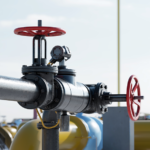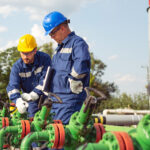Midstream companies are increasingly adopting AI for emissions management, risk assessment, maintenance, storage optimization, and regulatory compliance. For project managers overseeing pipeline, processing facility, and terminal construction, these technologies provide powerful solutions to longstanding challenges in safety, efficiency, and environmental compliance.
This post explores how AI applications have a high business impact on midstream construction and provide a competitive advantage in an increasingly regulated industry.
Emissions Management Through AI
Midstream construction projects face growing pressure to minimize environmental impacts. AI-driven emissions management systems now offer capabilities with real-time methane detection using computer vision and infrared technologies. This method can identify leaks significantly faster, while predictive emissions modeling forecasts potential release points before they occur.
These systems are complemented by automated reporting tools that streamline regulatory documentation while reducing human error. Additionally, AI can optimize construction sequences to minimize equipment idle time and associated emissions.
Recent industry case studies demonstrate these technologies can reduce emissions by 40-60% during construction phases while simultaneously lowering compliance costs.
Predictive Analysis for Construction Management
AI’s predictive capabilities are changing how midstream projects are planned and executed. These predictive tools enable project managers to shift from reactive to proactive management, potentially saving millions in delay costs on major projects:
Weather Impact Forecasting allows precise scheduling around adverse conditions, which is particularly valuable for sensitive installation operations.
Supply Chain Disruption Prediction helps mitigate materials delays before they affect critical paths, an increasingly important function in today’s volatile global supply environment.
Project managers also benefit from Equipment Failure Prediction that identifies potential breakdowns before they cause costly downtime.
Comprehensive Project Delay Risk Assessment continuously evaluates schedule risks based on multiple variables, enabling teams to address potential issues proactively.

Edge Computing and Digital Twins
The combination of edge computing and digital twin technology is particularly valuable in remote construction environments with limited connectivity common to midstream projects.
Real-time progress monitoring against digital twin models identifies deviations immediately, allowing for rapid correction before rework becomes extensive. Edge-based inspection systems can process visual data on-site without requiring constant connectivity to corporate networks or cloud systems.
Digital twins initially were deployed in capital-intensive oil and gas production facilities to streamline processes, mitigate emission footprints, and generate cost savings. Now, companies are creating twins of their pipeline systems, gas plants, and liquefied natural gas terminals, as well as refineries and petrochemical complexes. It is estimated that the global digital twins’ market will be worth $154 billion by 2030.
Regulatory Compliance Automation
AI is improving regulatory compliance in midstream construction through integrated risk assessment and management systems. Automated permit tracking ensures proper authorization throughout the project lifecycle, while real-time compliance documentation eliminates last-minute information gathering.
These tools analyze historical safety incidents, environmental breaches, and operational disruptions to predict and prevent compliance risks across multiple jurisdictions. By continuously monitoring emissions against permitted thresholds and automating required reporting, these technologies help companies avoid penalties while maintaining their social license to operate.
Benefits and Challenges
The implementation of AI in midstream construction offers substantial benefits, including cost reductions through efficiency gains and schedule compression. Safety improvements are significant, with many projects reporting substantial reductions in recordable incidents. Pipeline operators, contractors, and project managers have an opportunity to embrace innovation, pursue waste reduction, and improve construction productivity.
However, these benefits come with implementation challenges. Integration with legacy systems can be difficult, as many existing management platforms lack AI compatibility. The workforce requires training to effectively utilize AI tools, which can create resistance during initial deployment. Data quality issues can undermine AI effectiveness, as these systems require clean, consistent data to perform properly. Remote sites often face connectivity limitations requiring specialized infrastructure. Initial investment costs for sophisticated AI implementations can be substantial, and connected systems create potential cybersecurity vulnerabilities that must be addressed.
Looking Ahead
Several emerging trends will shape AI applications in midstream construction. Autonomous construction equipment can perform routine tasks with minimal human oversight, AR/VR integration with AI offers enhanced visualization and training capabilities that can change how workers interact with complex systems and structures.
Advanced materials optimization using AI can reduce waste and improve performance, an increasingly important consideration as sustainability becomes a priority. Cross-project learning systems will apply insights from completed projects to new ones, creating continuous improvement cycles. Integrated carbon management throughout the construction lifecycle will help companies meet increasingly stringent environmental requirements.
About KBCm
CM representation is critically important for all construction, especially energy sector projects, as these are complex, high-risk, and require precise coordination across multiple disciplines. With over 40 years of experience, we have the boots on the ground experience needed – from conceptual design to project close out. Contact Skyler at (940) 366-2231 for more information.



